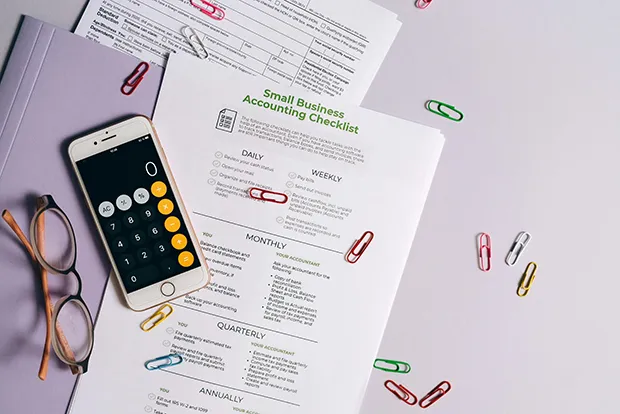
Why is Accounting Important for Small Businesses?
As a small or mid-size business owner, you're likely wearing multiple hats - from CEO to janitor and everything in between. With so much on your plate, it's easy to overlook the importance of accounting.
But here's the thing: understanding the nuts and bolts of your business finances isn't just a good idea; it's crucial for your success.
Let's dive into the world of small business accounting and explore why it's such a big deal.
What Is Accounting?
Before we jump into the nitty-gritty, let's start with the basics.
What exactly is accounting?
Well, think of it as the language of business. It's the process of recording, classifying, and summarizing financial transactions to provide information that is useful in making business decisions.
Accounting isn't just about crunching numbers (although there's plenty of that). It's about telling the story of your business through financial data. It's like keeping a detailed diary of every dollar that comes in and goes out of your business.
This financial storytelling helps you understand where your business stands, where it's been, and where it's heading.
Why Is Accounting Important?
Now that we've got a handle on what accounting is, let's talk about why it's so darn important. Here are a few key reasons:
- Financial Health Check: Accounting gives you a clear picture of your business's financial health. It's like a regular check-up with your doctor, but for your business's wallet.
- Decision Making: Good accounting practices provide you with the information you need to make informed business decisions. Should you invest in new equipment? Can you afford to hire another employee? Your accounting records will help you answer these questions.
- Legal Compliance: Proper accounting ensures you're complying with tax laws and regulations. Nobody wants to run afoul of the IRS!
- Securing Financing: If you're looking to secure a loan or attract investors, you'll need accurate financial records. Lenders and investors want to see that you've got your financial ducks in a row.
- Planning for the Future: Accounting helps you budget and forecast, allowing you to plan for your business's future growth and success.
How Does Accounting Help Small and Mid-size Businesses?
Small and mid-size businesses are the backbone of our economy, but they often operate on tight margins. That's where good accounting practices come in.
Here's how accounting can be a game-changer for smaller enterprises:
Cash Flow Management
Cash is king in small business, and accounting helps you keep a close eye on your cash flow. It allows you to track incoming revenue and outgoing expenses, ensuring you always have enough cash on hand to keep the lights on and the business running smoothly.
Profitability Analysis
Accounting helps you understand which products or services are your most profitable. This insight can guide your business strategy, helping you focus on what's working and improve or phase out what's not.
Tax Preparation
Nobody likes tax season, but good accounting practices make it a whole lot easier. By keeping accurate records throughout the year, you'll be well-prepared when it's time to file your taxes. Plus, you might even uncover some deductions you didn't know you were eligible for!
Growth Planning
As your business grows, your accounting needs will grow too. Good accounting practices help you scale your business effectively, providing the financial insights you need to make smart growth decisions.
Performance Measurement
Accounting allows you to set financial goals and measure your progress towards them. It's like having a scorecard for your business, helping you celebrate your wins and identify areas for improvement.
Types of Accounting
Now that we've covered the 'why,' let's look at the 'what.' There are several types of accounting that small businesses should be aware of:
- Financial Accounting: This involves preparing financial statements like balance sheets, income statements, and cash flow statements. It's all about reporting on the financial position of your business.
- Managerial Accounting: This type of accounting focuses on providing information to help managers make decisions. It's more forward-looking than financial accounting.
- Tax Accounting: As the name suggests, this involves preparing tax returns and planning for future tax obligations.
- Cost Accounting: This helps businesses understand the costs associated with producing their products or services.
- Bookkeeping: While not technically a type of accounting, bookkeeping is the foundation of all accounting. It involves recording day-to-day financial transactions.
Setting Up Accounting

Setting up an accounting system might seem daunting, but it doesn't have to be. Here's a step-by-step guide to get you started:
- Choose an Accounting Method: You'll need to decide between cash-basis or accrual accounting. Cash-basis is simpler and records transactions when money changes hands. Accrual accounting records income when it's earned and expenses when they're incurred, regardless of when money changes hands.
- Set Up a Chart of Accounts: This is a list of all the accounts you'll use to categorize your transactions. Common categories include assets, liabilities, income, and expenses.
- Decide on a System: Will you use spreadsheets, accounting software, or hire a professional? Your choice will depend on your business size and complexity.
- Establish Bookkeeping Processes: Set up systems for recording transactions, reconciling bank statements, and generating financial reports.
- Plan for Taxes: Set aside money for taxes and establish a system for tracking tax-deductible expenses.
Example:
Let's say you're starting a small bakery. Here's how you might set up your accounting:
- Accounting Method: You choose cash-basis accounting for simplicity.
- Chart of Accounts: You set up accounts for:
- Assets (e.g., Cash, Equipment)
- Liabilities (e.g., Loans, Credit Card)
- Income (e.g., Cake Sales, Cookie Sales)
- Expenses (e.g., Ingredients, Rent, Utilities)
- System: You decide to use QuickBooks Online for small businesses.
- Bookkeeping Process: You set a routine to enter sales and expenses daily, reconcile your bank statement weekly, and generate a profit and loss statement monthly.
- Tax Planning: You set aside 25% of your profits each month for taxes and keep all receipts for ingredients and equipment purchases as potential deductions.
Remember, it's okay to start simple and grow your accounting practices as your business grows. The most important thing is to start!
How Many Small Businesses Do Accounting?
Understanding how many small businesses engage in proper accounting practices can provide valuable context for entrepreneurs. Let's break down some key statistics:
1. Frequency of Financial Review:
- 26% of small business owners review their books monthly
- 23% review them quarterly
- 17% only look at their books at tax time
- Alarmingly, 18% admit to never reviewing their books
2. Impact on Business Success:
Businesses that keep updated financial records are 15% more likely to succeed than those that don't.
3. DIY vs. Professional Help:
Approximately 60% of small business owners feel they are not very knowledgeable about accounting and finance. As a result:
- About 40% of small businesses handle accounting themselves
- Around 30% use accounting software
- Roughly 30% outsource to an accounting professional
4. Software Usage:
A study by Clutch found that 53% of small businesses use accounting software. QuickBooks is the most popular, used by 74% of small businesses that use accounting software.
These statistics highlight a few important points:
- While most small businesses recognize the importance of accounting, many still struggle with it.
- There's a trend towards using technology to manage accounting tasks.
- Regular review of financial data correlates with business success.
For small business owners, these numbers underscore the importance of establishing solid accounting practices, whether that means learning to do it yourself, investing in software, or hiring a professional. Remember, good accounting isn't just about compliance – it's a vital tool for business growth and success.
Software and Tools for Small Business Accounting
In today's digital age, there's no shortage of tools to help small businesses manage their accounting. Here are some popular options:
|
Software |
Key Features |
Best For |
|
Comprehensive accounting, invoicing, payroll |
Small to medium businesses |
|
|
Cloud-based, bank reconciliation, inventory tracking |
Service-based businesses |
|
|
Simple interface, time tracking, project management |
Freelancers and solopreneurs |
|
|
Free basic accounting and invoicing |
Very small businesses and startups |
|
|
Comprehensive accounting, invoicing,payroll |
Small to medium businesses |
Remember, the best tool for you will depend on your specific business needs, budget, and technical expertise.
Best Practices for Small Business Accounting
Now that we've covered the basics, let's look at some best practices to keep your small business accounting on track:
- Keep Personal and Business Finances Separate: Open a separate business bank account and credit card. This makes it much easier to track business expenses and income.
- Record Everything: Every transaction, no matter how small, should be recorded. This level of detail will be invaluable come tax time.
- Set Aside Time for Bookkeeping: Don't let it pile up. Set aside time each week to update your books.
- Use Cloud-Based Software: This allows you to access your financial information from anywhere and provides an automatic backup of your data.
- Stay Organized: Keep all receipts and important documents filed in an organized system. Consider scanning them for easy digital storage.
- Review Financial Statements Regularly: Don't just record the information; use it. Regularly review your financial statements to understand how your business is performing.
- Plan for Major Expenses: Use your accounting data to budget for big expenses like equipment upgrades or expansion.
- Hire a Professional When Needed: While it's great to handle your own books, don't hesitate to bring in a professional accountant for complex issues or during tax season.
Conclusion
Recap of Key Points
We've covered a lot of ground in this article. Let's recap the main points:
- Accounting is the language of business, helping you understand and communicate your financial story.
- It's crucial for small businesses, providing insights for decision-making, ensuring legal compliance, and facilitating growth.
- There are different types of accounting, each serving a specific purpose in your business.
- Setting up an accounting system involves choosing a method, setting up accounts, and establishing processes.
- There are many software tools available to help small businesses manage their accounting.
- Best practices include keeping personal and business finances separate, recording everything, and regularly reviewing financial statements.
Importance of Accounting
The bottom line is this: good accounting practices are not just a nice-to-have for small businesses; they're a must-have. They provide the financial clarity you need to make informed decisions, plan for the future, and ensure your business's long-term success.
Remember, you don't have to be a math whiz or a financial guru to handle your business accounting. With the right tools, practices, and occasionally, professional help, you can master your business finances and set your small business up for success.
So, take that first step. Set up your accounting system, start tracking those numbers, and watch as the financial story of your business unfolds. Your future self (and your business) will thank you!
FAQs
Why do small businesses need accounting?
Small businesses need accounting to track their financial health, make informed decisions, comply with tax laws, secure financing, and plan for future growth. It provides a clear picture of where money is coming from and where it's going, which is crucial for business success.
Why is accounting so important for a business?
Accounting is important because it provides the data necessary for making sound business decisions. It helps in budgeting, tax preparation, and financial reporting. Moreover, it gives business owners and stakeholders a clear understanding of the company's financial position and performance.
What is the role of accounting in small business management?
In small business management, accounting plays a crucial role in financial planning, performance measurement, and decision-making. It helps managers understand the financial implications of their decisions, monitor the business's financial health, and identify areas for improvement or investment.
Why do you need a business account for a small business?
A separate business account is essential for a small business to keep personal and business finances separate. This separation makes it easier to track business income and expenses, simplifies tax preparation, adds professionalism, and can provide legal protection by maintaining the separation between personal and business assets.
Why is it important for an entrepreneur to understand accounting?
Understanding accounting is crucial for entrepreneurs because it allows them to make informed financial decisions, accurately assess their business's performance, comply with tax laws, and communicate effectively with investors, lenders, and other stakeholders. It's a fundamental skill that can significantly impact an entrepreneur's ability to build and grow a successful business.

 Rohit Kapoor
Rohit Kapoor

